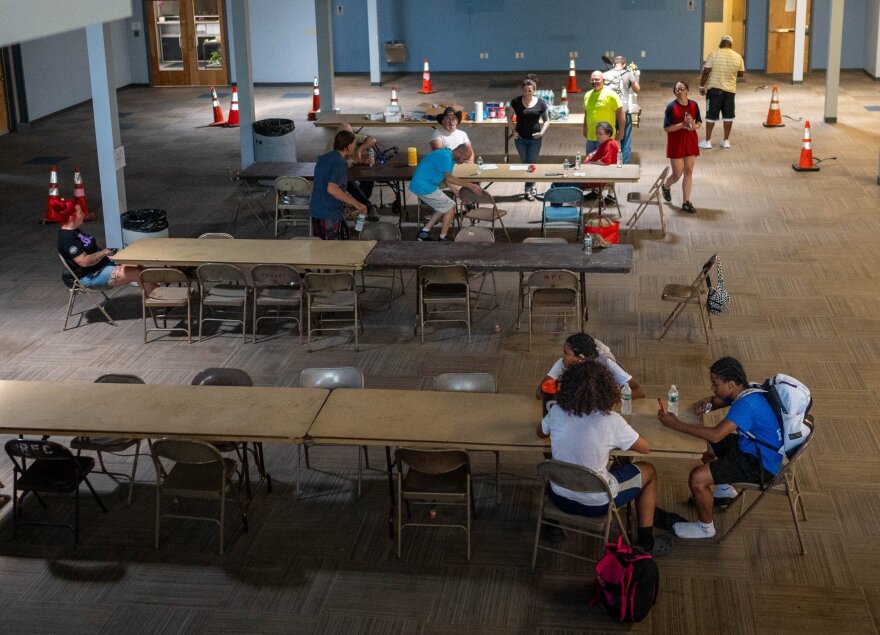On July 16, when temperatures in southern Maine reached the mid-90s, nanny Laken Turcotte knew exactly where to take her infant and toddler to the Scarborough Public Library for air-conditioned comfort.
“It’s harder to do stuff with the baby out in the heat, so this is a good spot to come when you want to not be hot,” Turcotte explains.
Throughout the summer, the Maine Emergency Management Agency’s website lists the library as one of the cooling centers. There isn’t a large audience, but it’s difficult to tell how many people are here to read or cool down, according to assistant director Catherine Morrison.
“Sometimes on the hotter days we have noticed that people are lingering, you know, sitting and reading for longer,” Morrison explains. “Today not so much, but maybe later in the day as it gets hotter.”
Despite Maine’s reputation as a frigid climate, hundreds of individuals have visited emergency rooms in recent years due to heat-related illnesses. Libraries, fire stations, and community centers are offering cooling centers to provide relief.
It’s but one instance of how the state is reacting to what is anticipated to become the norm as summer heats up for people, animals, and plants due to human-caused climate change.
On hot days, the Bridgton Community Center, located farther inland, also acts as a cooling center.
Executive Director Darcey Pomerleau adds, “People will often come in here, plug in, and do what they need to do.”
She shows off the various rooms where guests may relax, watch TV, use computers, and even have a bite to eat or drink. However, nobody is here to cool off specifically this afternoon.
“So it varies,” comments Pomerleau. “Mainers have a rough core. They are ready for a wide range of situations.
During an early heat wave this summer, a record 110 cooling facilities opened, according to Bill Guindon, mass care coordinator for the Maine Emergency Management Agency. It’s almost twice as high as it was last year. However, how many individuals actually utilize them?
“It’s not uncommon to have facilities open and nobody going, you know, other than the normal business traffic,” he continues.
MEMA doesn’t keep official records on usage. According to Guindon, it doesn’t always matter.
“It’s not whether people show up, but knowing that a community has somewhere for people to go is really important,” according to him.
Because as Maine grows hotter, the need will probably grow. By 2050, it’s predicted that the frequency of days with temperatures above 90 degrees would have doubled or quadrupled. Additionally, a terrible heat wave that killed hundreds of people occurred not too long ago in British Columbia, Washington, and Oregon.
“This definitely could happen here,” says Rebecca Lincoln, an environmental epidemiologist at the Maine Center for Disease Control, of the 2021 hot event in the Pacific Northwest.
Portland, Oregon, and Portland, Maine are the locations. She claims that the climates are quite similar. “The populations are quite comparable. There are similarities between this combination of urban and rural areas, and the difficulties will be the same.
According to Lincoln, in any given year, between 100 and 400 persons in Maine visit emergency rooms due to heat-related diseases. However, heat also makes other illnesses worse, including diabetes, kidney, respiratory, and cardiovascular disorders. According to her, Mainers must understand the dangers and take precautions.
The free 211 helpline’s program director is Nikki Williams.
“We have a relationship with Maine Emergency Management Agency where we can be activated to help the public find needed information during times of disaster or extreme heat or extreme weather events,” she continues.
According to Williams, they do receive calls regarding cooling centers.
“People aren’t listing any specific barriers, other than asking, ‘Well, is there something closer?'” she claims.
Williams also notes that during the warmer months, 211 is receiving more calls from people in need of help paying their power bills. Additionally, the need for cooling centers to escape the heat and high electricity costs may increase if individuals find it difficult to pay for fans or air conditioning.
This item was contributed to by Carol Bousquet, a reporter with the Maine Public.
As part of an effort by the Portland Press Herald and Maine Public, this story was covered.





